National Liberal Party (Romania)
The National Liberal Party (Romanian: Partidul Național Liberal, PNL) is a conservative-liberal[17] and liberal conservative[18] political party in Romania. Refounded in 1990, it claims the legacy of the major political party of the same name, active between 1875 and the late 1940s in the Kingdom of Romania. Based on this legacy, it often presents itself as the first formally constituted political party in the country and the oldest party from the family of European liberal parties.[19]
National Liberal Party Partidul Național Liberal | |
|---|---|
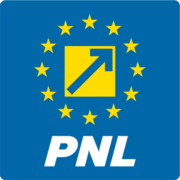 | |
| Abbreviation | PNL |
| President | Ludovic Orban |
| Secretary-General | Robert-Ionatan Sighiartău |
| Leader in the Senate | Cătălin-Daniel Fenechiu |
| Leader in the Chamber of Deputies | Florin Roman |
| Leader in the European Parliament | Rareș Bogdan |
| Founded | |
| Headquarters | Modrogan nr 1, Sector 1, Bucharest, Romania |
| Student wing | Liberal Student Clubs (CSL) |
| Youth wing | National Liberal Youth (TNL) |
| Women's wing | Liberal Women National Organisation (ONFL) |
| Membership (2018) | 253,895[5] |
| Ideology | Conservative liberalism Liberal conservatism Pro-Europeanism[6] |
| Political position | Centre[7] to centre-right[8][9] |
| European affiliation | European People's Party |
| International affiliation | Centrist Democrat International |
| European Parliament group | European People's Party |
| Colors | Yellow Blue |
| Slogan | Prin noi înșine! ("Through Ourselves!") |
| Anthem | "Verde-nrourat"[10] "Dewy Green" |
| Senate | 31 / 136 [11] |
| Chamber of Deputies | 81 / 329 [12] |
| European Parliament | 10 / 33 [13] |
| Mayors | 1,066 / 3,186 [14][15] |
| County Councilors | 504 / 1,434 [14] |
| Local Council Councilors | 13,697 / 40,067 [14][15] |
| Website | |
| pnl | |
[16] | |
Until 2014, the PNL was a member of the Alliance of Liberals and Democrats for Europe (ALDE).[20] The party statutes adopted in June 2014 dropped any reference to international affiliation, consequently most of its MEPs joined the European People's Party group (EPP) in the European Parliament. The implication of this decision in internal Romanian politics was that the PNL gradually re-defined itself as a political party akin to the ideology and activity of Germany's CDU/CSU.
On 12 September 2014, it was admitted as a full member of the European People's Party,[21] and subsequently merged with the Democratic Liberal Party (PDL). The party was also a member of the Liberal International[22] before switching to Centrist Democrat International.[23] Currently, it is the second-largest party in the Romanian Parliament, with 81 seats in the Chamber of Deputies and 31 in the Senate, behind the opposition Social Democratic Party (PSD).
At local political level, the PNL has been very closely associated with either the Democratic Forum of Germans in Romania (FDGR/DFDR), more specifically in parts of Banat and Transylvania, or, formerly, with the Christian Democratic National Peasants' Party (PNȚ-CD), in southern Romania.
History
1990–2000: Re-foundation and first governing experiences
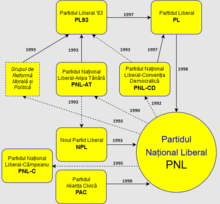
The National Liberal Party of Romania was re-founded in January, 1990, a few days after the end of the 1989 Romanian revolution. At that time, the party revolved around two political leaders such as Radu Câmpeanu and Mircea Ionescu-Quintus, both former youth liberal leaders during the interwar period and after World War II. At the 1990 general elections, the PNL became the third largest party in Romania and its then leader, Radu Câmpeanu, finished second in the same year's presidential elections, with 10.6% of the cast votes, behind Ion Iliescu.
Shortly afterwards, most notably alongside the Christian Democratic National Peasants' Party (PNȚ-CD), but to a lesser extent also with other smaller center-right parties and NGOs, the PNL managed to form the Romanian Democratic Convention (CDR) in an effort to ensemble a stronger collective opposition and alternative governing body to then ruling National Salvation Front (FSN). However, prior to the 1992 general elections, Câmpeanu decided to withdraw the party from the CDR electoral alliance and instead compete as a stand-alone political force.
Ultimately, this proved to be a strategic error, as the party did not manage to surpass the needed electoral threshold for parliamentary presence and as such was forced to enter extra-parliamentary opposition for the period 1992–1996. This also resulted in several splinter factions leaving the main party, with some PNL groups opting to remain within the CDR while others still supporting Câmpeanu's side.
Nevertheless, after a change of leadership that saw Ionescu-Quintus as the new party leader elected in 1995, the PNL contested the 1996 general election as part of the CDR.[24] The 1996 general elections represented the first peaceful transition of power in post-1989 Romania, with the PNL, PNȚ-CD, Democratic Party (PD), and the Democratic Alliance of Hungarians in Romania (UDMR) forming a grand coalition that pushed the PDSR (formerly the FSN) in opposition for the period 1996–2000. The presidency was also won by the CDR's common candidate, more specifically Emil Constantinescu, who received support on behalf of all of the alliance's constituent parties (including the PNL political groups therein).
2000–2010: Opposition and second governing experiences
Between 1996 and 2000, because of the lack of political coherence within the parties of the governing CDR coalition and the multiple changes of cabinets that followed, the PNL decided once more to withdraw from the alliance just before the 2000 general elections and, consequently, to compete alone instead. This time, the party managed to gain parliamentary presence but failed to form another centre-right government, finishing fourth in the legislative elections and third in the presidential election.
Therefore, during the mid 2000s, the PNL joined forces with the PD in order to form the Justice and Truth Alliance (DA)[24] so as to compete in the 2004 general election as an alternative to the then ruling PSD (formerly PDSR) government. The alliance managed to finish second by popular vote in the Parliament, subsequently form a centre-right cabinet, and also win the presidency during the same year.
Until April 2007, the PNL was the largest member of the governing Justice and Truth Alliance, which enjoyed a parliamentary majority due to an alliance between the PNL, PD, the Conservative Party (PC) and the UDMR.[25] In April 2007, then PNL prime minister Călin Popescu-Tăriceanu, who was also the party leader, formed a minority government solely with the UDMR and the remainder PD ministers were reshuffled. This cause internal opposition within the party and led to a splinter group, the Liberal Democratic Party (PLD), eventually merging with the PD to form the Democratic Liberal Party (PDL).
After the 2008 legislative election the party placed third and entered official opposition, winning 19.74% seats in the Parliament, while the new grand coalition, formed by their former enlarged ally the democrat liberals (PDL) and the Social Democratic Party (PSD), had roughly 70%. At the 2009 presidential election the National Liberal Party's then newly elected leader, Crin Antonescu, finished third in the first round and the party still found itself in parliamentary opposition for the three next years to come.
2010–2020: USL, ACL, and third governing experiences
On 5 February 2011, the PNL formed the Social Liberal Union (USL) political alliance with the PSD, the National Union for the Progress of Romania (UNPR), and the Conservative Party (PC).[26][27] The PNL subsequently exited the USL on 25 February 2014, disbanding the alliance and returning to opposition.[28]
On 26 May 2014, following the 2014 European elections, then PNL party president Crin Antonescu announced he was seeking membership within the European People's Party (EPP).[29][30] At the beginning of the 8th European Parliament, 5 of the PNL MEPs sat with the EPP Group,[31] and 1 with the ALDE Group,[32] who later became an independent MEP within ALDE.
In late May, 2014 the party agreed to a future merger with the Democratic Liberal Party (PDL), with the two parties main short-time goal being to submit a joint candidate for the upcoming presidential election.[33] The PNL-PDL presidential candidate was agreed to run under an electoral banner called the Christian Liberal Alliance (ACL).[34][35]
On 27 June 2014, former PNL chairman Călin Popescu-Tăriceanu announced his intention to found a separate liberal party to run for president, stating opposition to the upcoming merger with the PDL.[36] The breakaway party, called the Liberal Reformist Party (PLR), was founded by Popescu-Tăriceanu on 3 July 2014.[37] On 17 July 2014 it was announced that the future merger of the PNL and PDL would retain the National Liberal Party name, while being situated in the PDL's existing headquarters in Bucharest, and would be legally registered by the end of 2014.[38] On 26 July 2014, a joint party congress of the PNL and PDL approved the merger.[39]
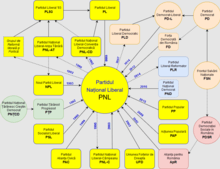
In the first round of the 2014 presidential election on 2 November 2014, ACL presidential candidate Klaus Johannis, PNL party president and Mayor of Sibiu (German: Hermannstadt, Transylvanian Saxon: Härmeschtat), was the runner-up.[40] Johannis won the runoff election held on 16 November 2014 with 54.5% of the total number of votes.[41][42] At the 2016 local elections and legislative elections, the PNL managed to finish second, behind the PSD, and consequently continuously in opposition until 2019. The year 2019 saw two minor parties adhering to the PNL, namely the PND (led by Daniel Fenechiu) and PACT (led by Sebastian Burduja), thereby increasing its total number of members.
Regarding the 2019 presidential election, the party had formally announced its support for a second term of incumbent state president Klaus Johannis in March, 2018 along with an official designation of Ludovic Orban, current party president, for the function of Prime Minister should the PNL win the 2020 legislative elections.[43][44] In June, 2018 at an open air press conference in his native Sibiu (German: Hermannstadt, Transylvanian Saxon: Härmeschtat), Johannis publicly announced his intention to run for a second presidential term.[45] In late 2019, the National Liberal Party acceded to governance under a minority stand-alone government led by Orban which was voted twice by the Parliament (under, most notably, a confidence and supply agreement with USR and PMP).
Ideology
The party adheres to the doctrine of liberalism in the form of conservative liberalism and national liberalism, advocating both economic and social liberalization.[46] In recent years, it has focused more on economic liberalism. The National Liberal Party also supports conservative initiatives and policies and the state in moral and religious issues, as well as the privatization and denationalization of the economy, a trend which is currently taking place quite rapidly in Romania, as in other post-communist economies in Central and Eastern Europe.
In economic regards, the National Liberal Party also deems significant the fact that taxes must be lowered and that the private sector of the national economy must be expanded and helped by a series of new laws in order to generate more value.[47] It also advocates a decentralization of Romania's political structure, with greater autonomy given to the eight development regions.
Structure
According to the Statute, the leading organs of the party are the following:[48]
Congress
The Congress, or The General Assembly of the delegates of the party's members (Romanian: Congresul; Adunarea Generală a delegaţilor membrilor partidului) is the supreme authority in the party. It leads the party and takes decisions at national level. Its members are elected by the local (territorial) organizations, and The National Consillium. The Congress meets every four years, after the parliamentary elections, or at any time needed. The Congress is convoked either by the Permanent Delegation (see below), at the request of the Central Political Bureau, or at the request of at least half of the Territorial Permanent Delegations. The Congress elects the President of the National Liberal Party, the 15 vice-presidents of the Central Standing Bureau (7 with specific attributions and 8 responsible for the development regions, 23 judges of The Honor and Referee Court (Romanian: Curtea de Onoare şi Arbitraj), 7 members of The Central Committee of Censors (Romanian: Comisia Centrală de Cenzori).
The last Congress took place between 5–6 March 2010, as both an Extraordinary and Ordinary Congress. The Extraordinary Congress took place on 5 March, because it was called three months earlier than the scheduled Ordinary Congress. It changed the Statute of the party. On 6 March the Congress was Ordinary, based on the new Statute.
Permanent Delegation
The Permanent Delegation (Romanian: Delegaţia Permanentă – DP) is the structure that leads the party between two Congresses. It meets monthly, or at any time needed. Its members are the following; the President of the National Liberal Party, the members of the Central Political Bureau, the President of the Senate of the party, the Secretary General of the National Liberal Party, the presidents of the two Chambers of the Parliament (if the officeholders are members of the PNL), the leaders of the National liberal Party's parliamentary groups, the Senators and Deputies, the MEPs, the Ministers, the President of the National Liberal Youth (TNL), the President of the Liberal Women Organisation (OFL), the President of the Liberal Student Clubs (CSL), the President of the League of the Local Elected Officeholders of the National Liberal Party (LAL PNL), the President of the Coordinating Council of the Municipality of Bucharest, the European Commissioner (if the officeholder is member of the PNL).
National Political Bureau
The National Political Bureau (Romanian: Biroul Politic Național – BPN) of the National Liberal Party proposes the party's politics and coordinates its application. It ensures the party's day-to-day leadership, and it is composed by the following: the President of the party, the 15 Vice-Presidents (7 with specific charges, and 8 responsible for the development regions). At the BPC's meetings can assist, with consultative vote, the president of the Senate of the PNL, the Secretary-General of the PNL, the Presidents of the two Chambers of the Parliament (if the officeholders are members of the PNL), the leaders of the National liberal Party's parliamentary groups, the President of the TNL, the President of the OFL, the President of the CSL, the President of the League of the LAL, and the Ministers. The BPC meets weekley, or at any time needed, convoked by the president of the PNL.
According to Article 70 of the PNL Statute, the BPN coordinates and evaluates the objectives of the territorial branches, of the parliamentary groups; it negotiates political agreements (within the limits established by the DP); it coordinates the elections campaign; proposes sanctions according to the Statute; proposes to the DP the political strategy of the party; proposes the candidates for the central executive or public offices; for certain territorial units, proposes to the DP the candidates for the parliamentary elections; proposes to the DP the candidates for the European Parliament elections; proposes the DP to dissolve or dismiss, for exceptional reasons, the territorial branch, or the branch's president; convokes the DP; coordinates the activity of the permanent committees of the National Council, validates or invalidates the results of the elections for the territorial branches; appoints the Secretary-Executive, the Foreign Secretary, and Deputy-Secretaries-General.
The BPN is assisted, in the organizing activity by the Secretary General of the PNL. This office ensures the communication between the central organisms and the territorial branches, ensures the management of the party's assets, is responsible for the informational system. The Secretary-General is assisted by the Deputy-Secretaries-General, appointed by the BPC at the suggestion of the Secretary-General.
As of 2018, the National Political Bureau is composed of the following members:[49]
- President: Ludovic Orban
- Secretary General: Robert Sighiartău
- Vice-Presidents: Ilie Bolojan, Raluca Turcan, Iulian Dumitrescu, Mircea Hava, Vlad Nistor, Laurențiu Leoreanu, Ben-Oni Ardelean, Florin Cîţu, Dan Motreanu, Adrian Oros, Virgil Guran, Ioan Bălan, Victor Paul Dobre, Răducu Filipescu, Gigel Știrbu, Gheorghe Falcă, Lucian Bode, Florin Roman, Marian Petrache, Cristian Bușoi
- Leader of the PNL Parliamentary Group in the Senate: Iulian Dumitrescu
- Leader of the PNL Parliamentary Group in the Chamber of Deputies: Raluca Turcan
In normal conditions, the term of the BPN members ends during the Party's Congress, when the president leaves the presidium of the Congress. The president of the Standing Bureau of the Congress is, formally, the acting president of the party until the new president is elected. The last acting president of the National Liberal Party was Mircea Ionescu-Quintus on 20 March 2009, when Crin Antonescu succeeded Călin Popescu-Tăriceanu.
National Council
The National Council (Romanian: Consiliul Naţional – CN) is the debate forum of the National Liberal Party between two Congresses. It reunites twice a year, or at any time necessary, convoked by the president, by the BPC, or at the request of at least half of its members. Its members are: DP, including the members with consultative vote; the Secretaries of State and the equivalent officeholders; the Prefects and Deputy-Prefects; Presidents and Vice-Presidents of the County Councils; Mayors and Deputy-Mayors of the county capitals, of the sectors of Bucharest, the General Mayor and General Deputy-Mayors of Bucharest; the Vice-Presidents and Secretaries-General of TNL, OFL, CSL, the Senate of the Party, LAL; honorary members of the party; the President of the structures that deal with specific issues; the Presidents of the CN.
The CN has the following competences: acts to fulfill the decisions of the Congress; adopts the Governing Program; adopts the programs and sectorial politics of the party; approves the reports of the specialty committees; names the candidate of the National Liberal Party for the Romanian Presidency; gives and retracts the quality of honorary member of the party.
According to Article 65 of the Statute, the CN is organized and functions through its permanent specialty committees, constituted on social and professional criteria. The committees constituted on social criteria promote the interests of the correspondent social category. The committees constituted on professional criteria state the sectorial politics and the public politics in major fields, to express the options and solutions proposed by the National Liberal Party.
President
The President of the National Liberal Party is the guardian of the political Program of the party, of the respect to the Statute and the keeping of the unity and prestige of the party.
Secretary-General
The Secretary-General ensures the communication between the central leading structures and the territorial ones, ensures the management of the assets of the party, is responsible for the informational system. The Secretary-General is helped in its activity by Deputy-Secretaries-General appointed by the BPC, upon the suggestion of the Secretary-General.
Other national structures
- The Senate of the party – consulting organism for the president regarding the continuity and development of the liberal traditions and concepts;
- Court of Honor and Arbitration – the supreme court of the party;
- Central Committee of Censors – checks the management of the party;
- Ethics Commission – analyzes the candidates proposed for the legislative elections and for the offices in the Government as well as other central offices;
- National Liberal Youth – coordinates the activity specific to the youth structures in the territory;
- League of the Local Elected Officeholders – coordinates the activity of the PNL members in the local public administration (mayors and deputy-mayors, local councilors, county councilors, county council presidents, and deputy-presidents);
- Liberal Women Organisation – coordinates the activity of the territorial women organizations;
- Liberal Student Clubs – promotes the liberal ideas and political program of the PNL through the students.
Local leading structures
The local leading structures of the National Liberal Party are the following:
- the General Assembly of the Members (Romanian: Adunarea Generală a membrilor – AG) – applies at local level the necessary measures for fulfilling the Program and Strategy.
- the Standing Bureau of the organization (Romanian: Biroul Permanent – BP) – leads the organization between two General Assemblies.
Symbol
Romanian law requires all parties to present a permanent sign and a permanent electoral sign. The former is used to identify the party's buildings and press releases, and the latter to identify the party's electoral materials and the candidates on the elections ballot. Usually they differ slightly.
The main element of the party is a blue arrow pointing to the upper right corner of a yellow square, and the letters P, N, and L in blue, tilted to the right. The position of the PNL with respect to the arrow depends on the type of symbol, as shown below.
 Current PNL logo and electoral sign (in use 2014–present)
Current PNL logo and electoral sign (in use 2014–present)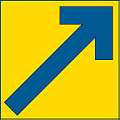 The former electoral sign (used prior to 2014)
The former electoral sign (used prior to 2014) Former permanent sign (used prior to 2014)
Former permanent sign (used prior to 2014)
Leadership
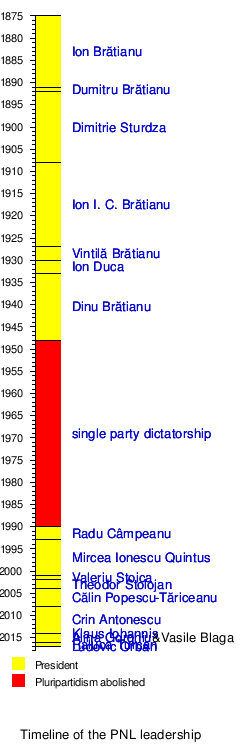
| Nº | Name Born - Died |
Portrait | Term start | Term end | Duration |
|---|---|---|---|---|---|
| 1 | Radu Câmpeanu (1922–2016) |
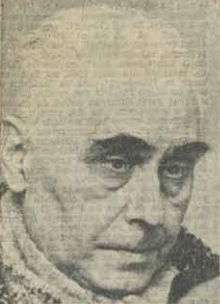 |
15 January, 1990 | 28 February, 1993 | 3 years, 1 month and 13 days |
| 2 | Mircea Ionescu-Quintus (1917–2017) |
28 February, 1993 | 18 February, 2001 | 7 years, 11 months and 21 days | |
| 3 | Valeriu Stoica (1953– |
18 February, 2001 | 24 August, 2002 | 1 year, 6 months and 6 days | |
| 4 | Theodor Stolojan (1943– |
.jpg) |
24 August, 2002 | 2 October, 2004 | 2 years, 1 month and 8 days |
| 5 | Călin Popescu-Tăriceanu (1952– |
_(15621866127)_(cropped_2).jpg) |
2 October, 2004 | 20 March, 2009 | 4 years, 5 months and 18 days |
| 6 | Crin Antonescu (1959– |
20 March, 2009 | 2 June, 2014 | 5 years, 2 months and 13 days | |
| 7 | Klaus Johannis (1959– |
.jpg) |
28 June, 2014 | 18 December, 2014 | 6 months and 16 days |
| 8 | Vasile Blaga1 (1956– |
 |
18 December, 2014 | 28 September, 2016 | 1 year, 9 months and 10 days |
| Alina Gorghiu2 (1978– |
_(cropped).jpg) |
18 December, 2014 | 12 December, 2016 | 1 year, 11 months and 24 days | |
| — | Raluca Turcan (Interim) (1976– |
.jpg) |
13 December, 2016 | 17 June, 2017 | 6 months and 4 days |
| 9 | Ludovic Orban (1963– |
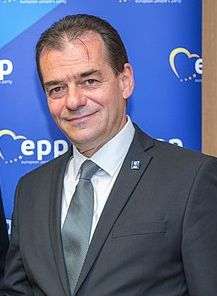 |
17 June, 2017 | present | 3 years, 1 month and 30 days |
Notes:
1 Co-president along with Alina Gorghiu until 28 September 2016 when he resigned from this dignity.
2 Co-president along with Vasile Blaga until 28 September 2016. Afterwards, sole party leader until the end of her term.
Presidency span (1990–present)

Notable members
Current members
- Ludovic Orban, current party president and Prime Minister of Romania, former Minister of Transport;
- Leonard Orban, economist, former European Commissioner on multilingualism;
- Emil Constantinescu, former President of Romania (1996–2000);
- Crin Antonescu, leader of the party between 2009 and 2014, former Minister of Youth and Sports, President of the Senate and Acting President of Romania (July–August 2012);
- Vasile Blaga, former co-president of the party between 2014 and 2016, former President of the Senate of Romania betwn 2011 and 2012;
- Alina Gorghiu, former co-president of the party between 2014 and 2016;
- Raluca Turcan, former acting president of the party in 2017;
- Theodor Stolojan, former president of the party between 2002 and 2004, former Prime Minister of Romania (1991–1992), and MEP;
- Emil Boc, Mayor of Cluj-Napoca, former Prime Minister of Romania (2008–2012);
- Cătălin Predoiu, former Minister of Justice and acting Prime Minister of Romania (2012);
- Andrei Chiliman, former mayor of Sector 1 in Bucharest;
- Gheorghe Flutur, President of the Suceava County Council, former Minister of Agriculture;
- Teodor Atanasiu, former Minister of National Defence;
- Eugen Nicolăescu, former Minister of Health;
- Daniel Dăianu, MEP, former Minister of Finance, and member of the Romanian Academy;
- Siegfried Mureșan, MEP, spokesman of the European People's Party;
- Nicolae Robu, current mayor of Timișoara (German: Temeschburg);
- Andrei Marga, former Minister of Education, Minister of External Affairs and rector of the Babeș-Bolyai University;
- Hermann Fabini, architect, art historian, and former senator;
- Roberta Anastase, former President of the Chamber of Deputies of Romania (2008–2012);
- Adrian Cioroianu, former Minister of Foreign Affairs, historian and journalist;
- Ovidiu Raețchi, political analyst.
- Crin Halaicu, former mayor of Bucharest (1992–1996) and businessman;
Former members
- Klaus Johannis, 5th President of Romania;
- Eduard Hellvig, Member of the European Parliament and current Director of the Romanian Intelligence Service;
- Sorin Frunzăverde, President of the Caraș-Severin County Council, MEP, former Minister of Environment, Minister of Tourism and Defence Minister;
- Mihai Răzvan Ungureanu, former Prime Minister of Romania (February–May, 2012) and Head of the Foreign Intelligence Service;
- Radu Câmpeanu, first president of the party after the 1989 revolution;
- Mircea Ionescu-Quintus, second president of the party after the Romanian revolution, serving between 1993 and 2001, former President of the Senate and Minister of Justice;
- Neagu Djuvara, historian and diplomat;
- Petre Țuțea, philosopher;
- Nicolae Manolescu, literary critic;
- Theodor Paleologu, historian and diplomat;
- Călin Popescu-Tăriceanu, former Prime Minister and former President of the Senate;
- Bogdan Olteanu, former President of the Chamber of Deputies of Romania;
- Teodor Meleșcanu, former Director of the Foreign Intelligence Service, Foreign Minister and Minister of National Defence;
- Mircea Diaconu, former Minister of Culture and member of the European Parliament, actor;
- Mihai Stănișoară, former Minister of National Defence;
- Norica Nicolai, MEP;
- Renate Weber, MEP, jurist;
- Ramona Mănescu, MEP and former Minister of Transport;
- Ovidiu Silaghi, former Minister for Small and Medium Enterprises and Minister of Transport;
- Radu Stroe, former Minister of Interior;
- Viorel Cataramă, businessman and former senator.
Electoral history
Legislative elections
| Election | Chamber | Senate | Position | Aftermath | ||||
|---|---|---|---|---|---|---|---|---|
| Votes | % | Seats | Votes | % | Seats | |||
| 1990 | 879,290 | 6.41 | 29 / 395 |
985,094 | 7.06 | 10 / 119 |
3rd | Opposition to FSN government (1990–1991) |
| FSN-PNL-MER-PDAR government (1991–1992) | ||||||||
| 1992 | 284,678 | 2.62 | 0 / 341 |
290,866 | 2.66 | 0 / 143 |
9th | Extra-parliamentary opposition to PDSR-PUNR-PRM government (1992–1996) |
| 1996 | 3,692,321 | 30.17 | 33 / 343 |
3,772,084 | 30.70 | 24 / 143 |
1st (within CDR)1 |
CDR-USD-UDMR (1996–2000) |
| 2000 | 747,263 | 6.89 | 30 / 345 |
814,381 | 7.48 | 13 / 140 |
4th | Opposition to PDSR minority government (2000–2004) |
| 2004 | 3,191,546 | 31.3 | 64 / 332 |
3,250,663 | 31.1 | 28 / 137 |
2nd (within DA)2 |
DA-PUR-UDMR (2004–2007) |
| PNL-UDMR minority government (2007–2008) | ||||||||
| 2008 | 1,279,063 | 18.60 | 65 / 334 |
1,291,029 | 18.74 | 28 / 137 |
3rd | Opposition to PDL-PSD government (2008–2009) |
| Opposition to PDL-UNPR-UDMR (2009–2012) | ||||||||
| USL government (2012) | ||||||||
| 2012 | 4,344,288 | 58.63 | 101 / 412 |
4,457,526 | 60.10 | 51 / 176 |
1st (within USL)3 |
USL government (2012–2014) |
| Opposition to PSD-UNPR-UDMR-PC government (2014) | ||||||||
| Opposition to PSD-UNPR-ALDE government (2014–2015) | ||||||||
| Supporting the technocratic Cioloș Cabinet (2015–2017) | ||||||||
| 2016 | 1,412,377 | 20.04 | 69 / 329 |
1,440,193 | 20.42 | 30 / 136 |
2nd | Opposition to PSD-ALDE government (2017–2019) |
| Opposition to PSD minority government (2019) | ||||||||
| PNL minority government (2019–present) | ||||||||
| 2020 | TBD | TBD | 0 / 329 |
TBD | TBD | 0 / 136 |
TBD | TBD |
Notes:
1 CDR members: PNȚCD (25 senators and 81 deputies), PNL, PNL-CD (1 senator and 4 deputies), PAR (3 senators and 3 deputies), PER (1 senator and 5 deputies), Ecologist Federation of Romania (FER - 1 senator and 1 deputy).
2 Justice and Truth Alliance members: PNL and PD (21 senators and 48 deputies).
3 Social Liberal Union was an alliance of two smaller alliances: Centre Left Alliance and Centre Right Alliance. Centre Left Alliance members: PSD and UNPR (5 senators and 10 deputies). Centre Right Alliance members: PNL (51 senators and 101 deputies) and PC (8 senators and 13 deputies).
Local elections
| Election | County Councilors (CJ) | Mayors | Local Councilors (CL) | Popular vote | % | Position | ||||||
|---|---|---|---|---|---|---|---|---|---|---|---|---|
| Votes | % | Seats | Votes | % | Seats | Votes | % | Seats | ||||
| 2008 | 1,521,191 | 18.20 | 297 / 1,393 |
1,721,834 | 19.50 | 706 / 3,179 |
1,576,214 | 19.80 | 8,529 / 40,297 |
1,537,840 | 18.08 | 3rd |
| 2016 | 2,529,986 | 30.64 | 504 / 1,434 |
2,686,099 | 31.50 | 1,081 / 3,186 |
2,478,549 | 29.60 | 13,198 / 40,067 |
2,529,986 | 30.64 | 2nd |
| 2020 | TBD | TBD | TBD | TBD | TBD | TBD | TBD | TBD | TBD | TBD | TBD | TBD |
| Election | County Presidents (PCJ) | Position | ||
|---|---|---|---|---|
| Votes | % | Seats | ||
| 2000 | 596,017 | 6.96 | 1 / 41 |
4th |
| 2004 | 1,445,674 | 15.99 | 6 / 41 |
2nd |
| 2008 | 1,537,840 | 18.08 | 5 / 41 |
3rd |
| 2012 | 4,260,709 |
49.71 | 15 / 41 |
1st (as USL) |
| 2016 | 2,529,986 | 30.64 | 8 / 41 |
2nd |
| 2020 | TBD | TBD | TBD | TBD |
Presidential elections
| Election | Candidate | First round | Second round | ||||
|---|---|---|---|---|---|---|---|
| Votes | Percentage | Position | Votes | Percentage | Position | ||
| 1990 | Radu Câmpeanu | 1,529,188 | 10.6% | 2nd | |||
| 1992 | Emil Constantinescu1 | 3,717,006 | 31.1% | 2nd | 4,641,207 | 38.6% | 2nd |
| 1996 | Emil Constantinescu1 | 3,569,941 | 28.2% | 2nd | 7,057,906 | 54.4% | 1st |
| 2000 | Theodor Stolojan | 1,321,420 | 11.8% | 3rd | |||
| 2004 | Traian Băsescu2 | 3,545,236 | 33.9% | 2nd | 5,126,794 | 51.2% | 1st |
| 2009 | Crin Antonescu | 1,945,831 | 20.0% | 3rd | |||
| 2014 | Klaus Johannis3 | 2,881,406 | 30.3% | 2nd | 6,288,769 | 54.4% | 1st |
| 2019 | Klaus Johannis | 3,485,292 | 37.8% | 1st | 6,509,135 | 66.09% | 1st |
Notes:
1 Emil Constantinescu was the common centre-right candidate that was endorsed by the PNL in both 1992 and 1996 as part of the larger Romanian Democratic Convention (CDR).
2 Traian Băsescu was the common centre-right candidate that was endorsed by the PNL in 2004 as part of the Justice and Truth Alliance (D.A.) alongside the now defunct Democratic Party (PD).
3 Although Klaus Johannis was a member of the PNL, he was the common centre-right candidate that was endorsed by the party in 2014 as part of the Christian Liberal Alliance (ACL) alongside the now defunct Democratic Liberal Party (PDL).
European Parliament elections
| Election | Votes | Percentage | MEPs | Position | Political group |
|---|---|---|---|---|---|
| 2004 | N/A | 20.0% |
7 / 35 |
2nd | Alliance of Liberals and Democrats for Europe (ALDE)1 |
| 2007 | 688,859 | 13.4% |
6 / 35 |
3rd | Alliance of Liberals and Democrats for Europe (ALDE) |
| 2009 | 702,974 | 14.5% |
5 / 33 |
3rd | Alliance of Liberals and Democrats for Europe (ALDE) |
| 2014 | 835,531 | 15.0% |
6 / 32 |
2nd | Alliance of Liberals and Democrats for Europe (ALDE)2 |
| 2019 | 2,449,068 | 27.0% |
10 / 32 |
1st | European People's Party (EPP) |
Notes:
1 During the 2004–09 EU parliament session, the Romanian parliament sent 7 delegates on behalf of the PNL to Brussels, Belgium.
2 Subsequently sought permission to adhere to the European People's Party (EPP) and had been accepted in the meantime.
See also
References
- Scurtu, Ioan (2003). Enciclopedia partidelor politice din România, 1859-2003 (in Romanian). Bucharest: Meronia. ISBN 9789738200548.
- Iván Zoltán Dénes (2006). Liberty and the Search for Identity: Liberal Nationalisms and the Legacy of Empires. Central European University Press. p. 383. ISBN 978-963-7326-44-8.
- "Scurt istoric". PNL (in Romanian). Archived from the original on 15 December 2014.
- Neagu, Alina (6 October 2014). "Tribunalul București a admis fuziunea prin contopire dintre PNL și PDL". HotNews.ro (in Romanian).
- Matache, Narcis George (3 May 2018). "Top 30 partide politice din România". The New Federalist (in Romanian).
- "PNL - Afiliere internațională" (in Romanian).
- "Romanian government defeats no-confidence vote as thousands protest". The Irish Times. Reuters. 27 June 2018. Retrieved 30 April 2019.
- Lavinia Stan; Rodica Zaharia (2012). "Romania". In Donnacha Ó Beacháin; Vera Sheridan; Sabina Stan (eds.). Life in Post-communist Eastern Europe After EU Membership: Happy Ever After?. Routledge. p. 188. ISBN 978-0-415-68084-4.
- "Graft-tainted Romanian left eyes election comeback". EURACTIV. 9 December 2016. Retrieved 30 April 2019.
- "Înțelegere politică pentru noul partid de dreapta. PNL și PDL vor cânta de acum "Verde-nrourat"". Digi24 (in Romanian). 17 August 2014.
- Senatul României. "Grupuri parlamentare" (in Romanian). Retrieved 17 July 2020.
- Camera deputaților. "Grupuri parlamentare" (in Romanian). Retrieved 17 July 2020.
- "Advanced search". European Parliament. Retrieved 17 July 2020.
- "BEC - Situația mandatelor pe partide" (in Romanian).
- "Partidul Național Liberal" (in Romanian).
- "Grupurile parlamentare". Chamber of Deputies (in Romanian).
- Caroline Close (2019). "The liberal family ideology: Distinct, but diverse". In Emilie van Haute; Caroline Close (eds.). Liberal Parties in Europe. Taylor & Francis. p. 344. ISBN 978-1-351-24549-4.
- Nordsieck, Wolfram (2016). "Romania". Parties and Elections in Europe. Retrieved 19 August 2018.
- "Antonescu: La 138 de ani de la înființarea sa destinul PNL este strâns legat de evoluția României și de parcursul european". Agerpres (in Romanian). 24 May 2013.
- Donatella M. Viola (2015). Routledge Handbook of European Elections. Routledge. p. 665. ISBN 978-1-317-50363-7.
- "EPP concerned over actions of radical Islamic militant groups and over latest political developments in Romania; welcomes five new member parties". European People's Party. 12 September 2014. Archived from the original on 13 April 2015.
- "Archived copy". Archived from the original on 25 May 2014. Retrieved 21 May 2016.CS1 maint: archived copy as title (link)
- "Centrist Democrat International - Member parties". Retrieved 17 April 2020.
- Richard Rose; Neil Munro (2009). Parties and Elections in New European Democracies. ECPR Press. pp. 215–216. ISBN 978-0-9558203-2-8.
- Villy Tsakona; Diana Elena Popa, eds. (2011). Studies in Political Humour: In Between Political Critique and Public Entertainment. John Benjamins Publishing. p. 162. ISBN 978-90-272-0637-4.
- "Romanian Oppositions Form Alliance". English.cri.cn. Retrieved 13 November 2011.
- "FOCUS Information Agency". Focus-fen.net. Retrieved 13 November 2011.
- "Romania's Liberals to leave ruling coalition, government". The Sofia Globe. 25 February 2014. Retrieved 16 July 2014.
- EurActiv (26 May 2014). "Romanian liberals seek EPP affiliation". EurActiv. Retrieved 16 July 2014.
- "Antonescu: I'll have talks with EPP in June". Actmedia.eu. 28 May 2014. Retrieved 16 July 2014.
- http://eppgroup.eu/party/Partidul-Național-Liberal-(RO)
- "ALDE MEP details". Alde.eu. Archived from the original on 23 May 2014. Retrieved 16 July 2014.
- "Romania's largest rightist parties agree on presidential candidate, fusion | Independent Balkan News Agency". Balkaneu.com. 29 May 2014. Retrieved 16 July 2014.
- "SIGLA ACL a intrat în producţie". ZIUAnews.ro. Retrieved 10 June 2015.
- "Ion Dumitrel, Florin Roman, Adrian Teban și Marius Ceteraș, prim-vicepreședinții Alianței Creștin Liberale Alba (ACL)". Ziarul Unirea. Archived from the original on 5 December 2014. Retrieved 10 June 2015.
- Newsroom (28 June 2014). "Calin Popescu Tariceanu will run for president". Retrieved 10 June 2015.
- ACTMedia - Romanian Business News. "Tariceanu: The Liberal Reforming Party is advancing Liberalism". Retrieved 10 June 2015.
- "Name of new party from PDL-PNL merger is PNL". Actmedia.eu. Retrieved 19 July 2014.
- "Merger protocol between PNL-PDL, new party statute, approved by joint congress". Retrieved 10 June 2015.
- "Romania's PM Ponta wins first round of presidential election". Reuters. 3 November 2014. Retrieved 10 June 2015.
- "Romania election surprise as Klaus Iohannis wins presidency". BBC News. 17 November 2014. Retrieved 10 June 2015.
- "Romanians elected Klaus Iohannis their new president for the next five years". Retrieved 10 June 2015.
- Niculescu, Anghel (18 June 2017). "Ludovic Orban a anunţat pe cine va susţine PNL la alegerile prezidenţiale din 2019! "Mă voi bate cu toată forţa mea să obţinem un nou mandat pentru Klaus Iohannis"". Express de Banat (in Romanian). Retrieved 4 August 2017.
- Sebastian Zachmann (11 March 2018). "Decizie PNL. Liberalii îl susţin pe Klaus Iohannis pentru un nou mandat de preşedinte. Ludovic Orban - premierul PNL". Adevărul (in Romanian).
- Digi24 (23 June 2018). "Klaus Iohannis va candida pentru un nou mandat de președinte: "Sunt ferm hotărât"". digi24.ro. Retrieved 23 June 2018.
- "Partidul Național Liberal, Despre Noi: Principii și valorile liberale". Archived from the original on 22 September 2018. Retrieved 22 April 2018.
- "Partidul Național Liberal, Angajamentul nostru: Programul de Guvernare al Partidului Național Liberal". Archived from the original on 29 August 2018. Retrieved 22 April 2018.
- (in Romanian) The structure of the Party Archived 12 March 2009 at the Wayback Machine
- "Biroul Executiv al PNL". PNL. Retrieved 22 April 2018.
Further reading
- PNL website retrieved 8 September 2012
- Cliveti, Gheorghe, Liberalismul românesc. Eseu istoriografic, Editura Fundației "AXIS", Iași, 1996;
- Istoricul PNL de la 1848 până astăzi, București, 1923;
- Rădulescu – Zoner, Șerban (coord.), Cliveti, Gheorghe, Stan, Apostol, Onişoru, Gheorghe, Șandru, Dumitru, Istoria Partidului Național Liberal, Editura All, București, 2000;
- Stan, Apostol, Iosa, Mircea, Liberalismul politic în România. De la origini până la 1918, Editura Enciclopedică, București, 1996;
- Naumescu, Valentin, Despre liberalism în România. Realităţi, dileme, perspective, EFES, Cluj-Napoca, 2001;
- Șomlea, Vasile-Florin, Mișcarea liberală din România post'1989, Editura Ecumenica Press, Cluj-Napoca, 2006;